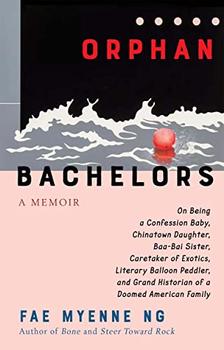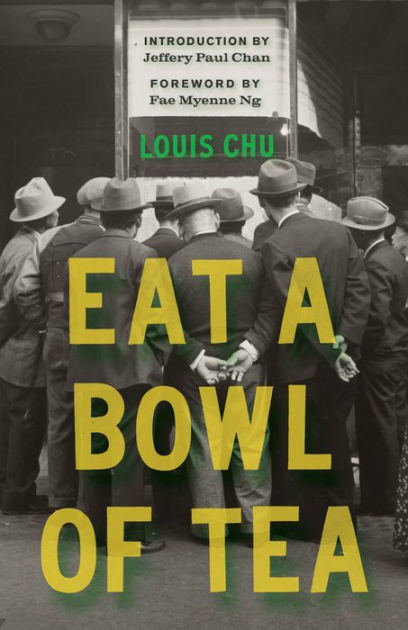Summary | Excerpt | Reviews | Beyond the Book | Read-Alikes | Genres & Themes | Author Bio

A Memoir
by Fae Myenne NgThis article relates to Orphan Bachelors
 In her book Orphan Bachelors, Fae Myenne Ng recalls her life-changing discovery of Louis Chu's "defiant, subversive novel" Eat a Bowl of Tea (1961), now considered a classic of Asian American literature, which depicts Manhattan Chinatown bachelor society in the late 1940s.
In her book Orphan Bachelors, Fae Myenne Ng recalls her life-changing discovery of Louis Chu's "defiant, subversive novel" Eat a Bowl of Tea (1961), now considered a classic of Asian American literature, which depicts Manhattan Chinatown bachelor society in the late 1940s.
The novel begins with two friends living in this milieu, Wang Wah Gay and Lee Gong. They are both technically married men but have been separated from their wives for decades. This is a normal state of affairs due to racist immigration laws that have kept Chinese male laborers from bringing their families to the United States, but the Exclusion Act has been repealed, and it is now possible for a Chinese American man to bring a wife to the country from China. The characters concoct the idea to arrange a marriage between Wah Gay's son, Ben Loy, and Lee Gong's daughter, Mei Oi. Ben Loy, who is currently living in Connecticut, travels to China to meet Mei Oi, and the two immediately fall in love. However, after the newlyweds leave for New York, Ben Loy becomes impotent, though he often hired sex workers before his marriage.
Subsequently, as Ng puts it, "the union follows the pattern of all post-Exclusion marriages: it becomes sexless and doomed." In her book, Ng suggests that the Exclusion Act had an effect on the sexuality and relationships of Chinese Americans that continued long after its repeal. Of Ben Loy and Mei Oi, she notes that their situations reverse: Mei Oi's husband loses his virility while she, characterized at first as innocent and pure, becomes more interested in sex than ever, eventually seeking satisfaction outside of her marriage. Ng sees Mei Oi as "our erotic avenger against Exclusion," writing that she "demands sex as retribution for the childless wives left in China's empty marital beds and also the Orphan Bachelors living sexless lives in America."
Eat a Bowl of Tea was notable for its realistic portrayal of American Chinatown life. In an introduction to the 1979 edition from University of Washington Press (a 2020 re-release additionally includes a foreword by Ng), the writer Jeffrey Paul Chan explains that Chu was the first author who didn't adhere to a stereotypical model of Chinese American society derived from simplistic ideas of the East versus West variety propagated by white missionaries, thereby breaking a trend of works that "ignore[d] the existence of a non-Christian bachelor population that represented the vast majority of Chinese-Americans for nearly a century."
Chu, born in Toishan, China, was also responsible for bringing the sensibilities of the Toishanese dialect to an English-language novel. Ng, who recognized the dialect as the characteristically loud one spoken — or rather, shouted — by her own family, declares, "Louis Chu was the first to bring the richness of Toishanese to the literary page, to show death-cursing as crucial to the Orphan Bachelor society's fearlessness." In his introduction, Chan points to a humorous example of the novel's language in the words of Chong Loo, a rent collector: "Go sell your ass, you stinky dead snake … If you want to make laughs, talk about something else, you trouble maker. You many-mouthed bird. You dead person."
Filed under Books and Authors
![]() This "beyond the book article" relates to Orphan Bachelors. It originally ran in July 2023 and has been updated for the
May 2024 paperback edition.
Go to magazine.
This "beyond the book article" relates to Orphan Bachelors. It originally ran in July 2023 and has been updated for the
May 2024 paperback edition.
Go to magazine.




Silent gratitude isn't much use to anyone
Click Here to find out who said this, as well as discovering other famous literary quotes!
Your guide toexceptional books
BookBrowse seeks out and recommends the best in contemporary fiction and nonfiction—books that not only engage and entertain but also deepen our understanding of ourselves and the world around us.